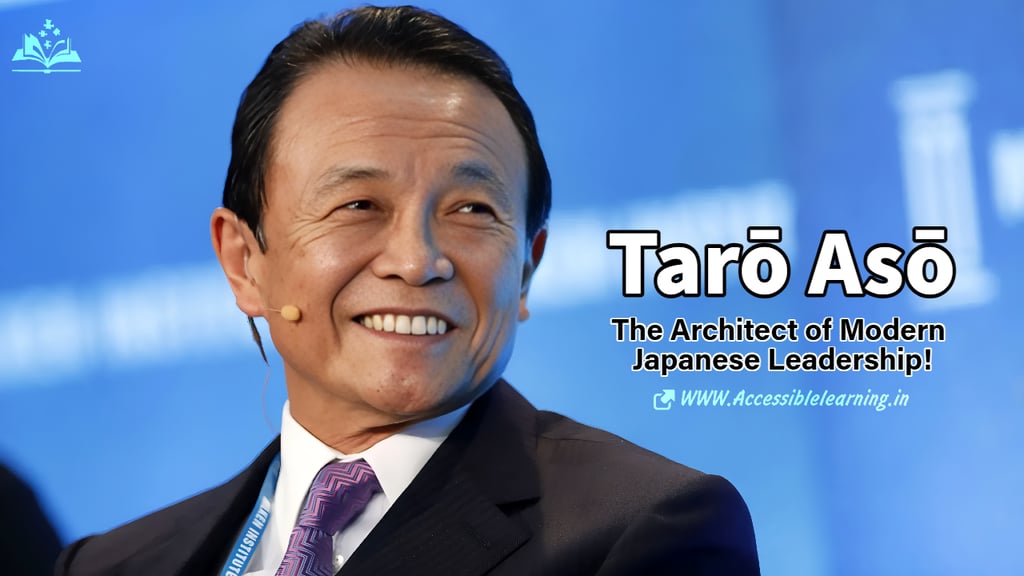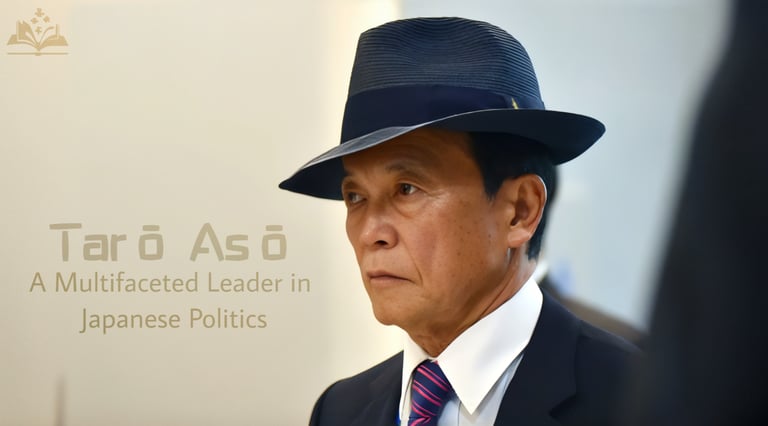
Tarō Asō: The Architect of Modern Japanese Leadership?
Explore the multifaceted career of Tarō Asō, a prominent Japanese politician, former Prime Minister, and a key figure in Japan's economic and diplomatic landscape. Learn about his leadership during crises, his family legacy, his influence in the LDP, and his innovative approaches to cultural diplomacy and rural development.
BIOGRAPHYTHE GREAT LEADERPOLITICAL JOURNEYJAPAN
Kim Shin
1/3/20258 min read


Tarō Asō, a prominent Japanese politician, businessman, and former Prime Minister of Japan, has played a key role in shaping the political landscape of Japan. Known for his candid style, leadership during a time of economic crisis, and involvement in Japan's foreign affairs, Asō's career is a testament to his resilience and adaptability in the ever-evolving world of politics. In this article, we explore the multifaceted nature of Asō's life and career, shedding light on his achievements, challenges, and lasting impact on Japan's political and economic future.
Early Life & Education!
Tarō Asō was born on September 20, 1940, in Fukuoka, Japan, into a family with deep political ties. His grandfather, Hidenori Asō, was a prominent politician who served as minister, while his father, Takakichi Asō, was a successful businessman. Raised in an environment where politics and business intertwined, Tarō Asō developed an early interest in both domains.
Asō's education followed a path that would prepare him for leadership. He attended the prestigious Gakushuin University in Tokyo, where he studied law, a foundation that would later prove invaluable in his political career. After completing his undergraduate studies, Asō further honed his academic credentials at the prestigious Harvard University in the United States, where he studied public administration.
Political Rise & Early Career!
Asō’s political career began in 1979, when he was elected as a member of the House of Representatives. His early years in the Diet (Japan's national legislature) allowed him to establish a reputation as a steady and pragmatic politician. He was initially a member of the Liberal Democratic Party (LDP), a center-right political party that has dominated Japan's politics for much of the post-war period.
During his early career, Asō held a variety of important positions within the government, including the Ministry of Foreign Affairs and Ministry of Finance. He was known for his strong stances on Japan’s economic policy and international relations, focusing on maintaining Japan’s global standing.
Serving as Prime Minister of Japan!
Tarō Asō’s most significant political achievement came in 2008, when he became the 92nd Prime Minister of Japan. He assumed office during a time of profound economic instability, as the world was grappling with the global financial crisis. As Japan's economy faced severe challenges, including a sharp decline in exports and an increase in unemployment, Asō was tasked with navigating a complex political and economic landscape.
Despite his efforts to combat the crisis, Asō's tenure as Prime Minister was marked by public dissatisfaction with his leadership style. Critics pointed to his frequent gaffes and erratic public behavior, which often overshadowed his policy initiatives. His government faced significant setbacks, and his approval ratings plummeted. Eventually, his administration succumbed to political pressure, and in 2009, the LDP lost power to the Democratic Party of Japan (DPJ), marking the end of Asō's time as Prime Minister.
Return to Leadership and Later Roles!
After his resignation as Prime Minister, Tarō Asō’s political career was far from over. He returned to a prominent position within the LDP and served as the Deputy Prime Minister of Japan from 2012 to 2021. As Japan's Deputy Prime Minister and Minister of Finance, Asō played a crucial role in shaping the country's fiscal policy during a period of global economic uncertainty, including Japan’s recovery from the aftermath of the 2011 earthquake and tsunami.
Under his leadership, the government enacted measures to stimulate the economy, reduce the national debt, and strengthen Japan’s position in the international arena. Asō became an advocate for economic reforms, including monetary easing and fiscal stimulus packages aimed at revitalizing Japan's stagnating economy. He was also a vocal supporter of Japan's military expansion and constitutional reforms, pushing for a reinterpretation of Japan's pacifist constitution.
Views on Japan’s Economy and Foreign Policy!?
Tarō Asō’s economic policies have been a defining feature of his career. As Japan’s finance minister, he focused on combating the country’s stagnant economic growth and deflationary pressures. Asō supported the continuation of Japan’s aggressive monetary policies under Prime Minister Shinzo Abe’s “Abenomics” program, which involved measures such as quantitative easing and structural reforms.
On foreign policy, Asō has been a staunch advocate for a stronger military presence in East Asia. He has expressed concerns about Japan's security in the face of growing threats from neighboring countries, particularly China and North Korea. His policies reflect a more assertive stance on the global stage, advocating for Japan’s greater involvement in international security frameworks and peacekeeping missions.


Family Legacy and Business Ties!
Tarō Asō comes from one of Japan’s most prominent and influential families, which has long been associated with both politics and business. His mother, Kazuko Yoshida, was the daughter of Shigeru Yoshida, a former Prime Minister of Japan known for rebuilding the country in the aftermath of World War II. This familial connection to a revered leader shaped Asō’s understanding of governance and diplomacy from a young age.
On the business side, the Asō family owns Asō Group, a conglomerate with interests in coal mining, construction, and cement. The family business played a crucial role in Japan’s post-war industrialization. However, the company faced controversies in the 2000s over its use of forced labor during World War II, an issue that further complicated Asō's political career. Although he was not directly involved in the company’s operations, the historical baggage of the Asō Group has occasionally come under public scrutiny during his political career.
International Engagement Through the "Arc of Freedom and Prosperity"
As Foreign Minister (2005–2007), Asō introduced the concept of the "Arc of Freedom and Prosperity," a strategic foreign policy initiative aimed at strengthening ties with nations along the arc spanning Central Asia, the Middle East, and Eastern Europe. The policy emphasized promoting democracy, human rights, and free markets as a counterweight to authoritarian regimes, particularly in China and Russia.
This policy showcased Asō's ambition to position Japan as a global leader in advancing democratic values and economic cooperation. While the policy received praise for its forward-thinking approach, it was criticized for lacking concrete action plans and resources to make it truly effective.
Advocacy for Cultural Diplomacy!
One lesser-known aspect of Tarō Asō’s political career is his strong support for Japanese pop culture diplomacy. As an avid fan of manga and anime, Asō sought to leverage Japan’s soft power by promoting its cultural exports. During his tenure as Foreign Minister, he pushed for increased funding and international exposure for Japanese pop culture, believing it could enhance Japan’s global image and foster goodwill with younger generations worldwide.
Asō’s unique approach to cultural diplomacy earned him the nickname “Rozen Asō” among manga and anime enthusiasts, particularly due to his public admiration for the manga series Rozen Maiden. While some critics dismissed his efforts as trivial, others recognized the value of soft power in bolstering Japan’s global influence.
Support for Rural Development and Local Economies!
Born in Fukuoka Prefecture, Asō has consistently shown a deep interest in addressing the challenges faced by rural Japan. As a legislator, he advocated for policies to revitalize local economies and reverse rural depopulation, a growing issue as young people migrate to urban areas for better opportunities. His proposals included providing subsidies for agriculture, improving rural infrastructure, and promoting tourism in less-developed regions of Japan.
Asō’s focus on rural Japan reflects his political roots in Fukuoka, where he has maintained a strong voter base. However, his policies have sometimes been criticized as overly reliant on government spending, raising concerns about fiscal sustainability.
Relationship with Shinzo Abe and Influence in the LDP!
Tarō Asō shared a close professional relationship with the late Prime Minister Shinzo Abe, forming a powerful alliance within the Liberal Democratic Party (LDP). The partnership between Abe and Asō, often referred to as the “Abe-Asō faction” or “Two A’s,” significantly influenced Japan’s domestic and foreign policies. Together, they championed constitutional reform, a strong U.S.-Japan alliance, and economic revitalization under the banner of Abenomics.
Asō’s role as Deputy Prime Minister during Abe’s administration was crucial in ensuring policy continuity and stability within the LDP. Even after Abe stepped down, Asō remained a key figure in the party, wielding significant influence in leadership decisions and maintaining unity among conservative factions.
Environmental & Energy Policies!
Asō has also contributed to Japan’s environmental and energy policies, particularly in the context of climate change and sustainable development. As Minister of Finance, he supported Japan’s commitment to the Paris Agreement and advocated for investments in renewable energy sources, such as solar and wind power.
Following the Fukushima Daiichi nuclear disaster in 2011, Asō was involved in discussions on Japan’s energy security. While he supported the gradual resumption of nuclear energy to reduce dependence on fossil fuels, he also emphasized the need to enhance safety regulations and diversify Japan’s energy mix. His pragmatic approach aimed to balance environmental concerns with the economic realities of energy consumption in a resource-limited nation like Japan.


Resignation as LDP Vice President!
In late 2021, Asō stepped down from his long-held role as the Vice President of the Liberal Democratic Party. This marked the beginning of his gradual withdrawal from frontline politics. While he remains active as an influential figure and advisor, his departure signified the end of an era for one of Japan’s most enduring political careers. His resignation reflected a broader generational shift within the LDP as younger politicians began to take the reins.
Philanthropic Efforts and Legacy
Beyond politics, Asō has contributed to philanthropic efforts through the Asō Group, which supports initiatives in education, healthcare, and disaster relief. His commitment to improving the lives of ordinary Japanese citizens, particularly in rural areas, is part of his broader legacy.
In the cultural sphere, Asō is remembered for his advocacy for Japanese pop culture, which has helped elevate anime and manga to global prominence. His belief in the power of culture to foster international goodwill remains a defining feature of his leadership.
Controversies and Criticism!
Despite his extensive political experience, Asō’s career has not been without controversy. His tenure as Prime Minister was marked by a number of public gaffes, including remarks that were often viewed as insensitive or out of touch with the public. His comment about not being able to understand the suffering of the common people due to his wealthy background alienated many citizens, further eroding his popularity.
Additionally, Asō’s conservative views on social issues, particularly his stance on Japan’s wartime history, have led to tensions with neighboring countries such as South Korea and China. His comments regarding Japan’s responsibility during World War II have been interpreted by some as an attempt to downplay Japan’s role in wartime atrocities, further souring diplomatic relations.
Legacy & Impact
Tarō Asō’s legacy is multifaceted. While his time as Prime Minister was short-lived, his influence on Japan’s economic policy has been enduring. He played a pivotal role in Japan’s recovery from the global financial crisis and advocated for economic measures that had long-term effects on the country’s fiscal health.
As Deputy Prime Minister, Asō continued to shape Japan’s policies on both the domestic and international fronts, focusing on economic revitalization and military reform. His leadership was instrumental in guiding Japan through turbulent times, and his role in the Abenomics framework helped steer the country toward greater economic stability.
Tarō Asō is a complex figure in Japanese politics, marked by both achievements and controversy. From his early years as a legislator to his leadership during Japan's economic crisis and his subsequent return to power, Asō has demonstrated resilience and adaptability. His legacy, though debated, remains a significant chapter in Japan's modern political history. Through his dedication to Japan’s economic revitalization and his leadership in foreign affairs, Asō has left a lasting imprint on the country and its role in the world.
Subscribe To Our Newsletter
All © Copyright reserved by Accessible-Learning Hub
| Terms & Conditions
Knowledge is power. Learn with Us. 📚


